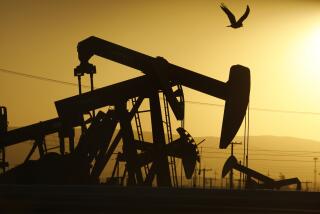Global warming is called ‘unequivocal’
- Share via
VALENCIA, SPAIN — Global warming is “unequivocal” and carbon dioxide already in the atmosphere commits the world to an eventual rise in sea levels of up to 4.6 feet, the world’s top climate experts warned Saturday in their most authoritative report.
“Only urgent, global action will do,” said U.N. Secretary-General Ban Ki-moon, calling on the United States and China -- the two biggest polluters -- to do more to slow global climate change. “I look forward to seeing the U.S. and China playing a more constructive role,” he said. “Both countries can lead in their own way.”
Ban, however, advised against assigning blame. Climate change imperils “the most precious treasures of our planet,” he said, and the effects are “so severe and so sweeping that only urgent global action will do. We are all in this together. We must work together.”
According to the U.N. panel of scientists, whose latest report is a synthesis of three previous ones, enough carbon dioxide already has built up to imperil islands, coastlines and one-fifth to two-thirds of the world’s species.
The panel portrays the Earth hurtling toward a warmer climate at a quickening pace and warns of inevitable human suffering. It says emissions of carbon, mainly from fossil fuels, must stabilize by 2015 and go down after that.
In the best-case scenario, temperatures will keep rising from carbon already in the atmosphere, the report said. Even if factories were shut down today and cars taken off the roads, the average sea level will gradually rise over the next 1,000 years to reach as high as 4.6 feet above that in the preindustrial period, or about 1850.
“We have already committed the world to sea-level rise,” panel’s Chairman Rajendra Pachauri said. But if the Greenland ice sheet melts, the scientists said, they cannot predict how much the seas will rise.
The report was adopted after five days of sometimes tense negotiations among 140 national delegations.
“The world’s scientists have spoken clearly and with one voice,” Ban said, looking ahead to an important climate conference in Bali, Indonesia, next month. “I expect the world’s policy makers to do the same.”
The report is intended to both set the stage and serve as a guide for the conference, at which world leaders will begin discussing a global climate change treaty to succeed the 1997 Kyoto Protocol.
“This report will have an incredible political impact,” Yvo de Boer, the U.N.’s top climate change official, said. “It’s a signal that politicians cannot afford to ignore.”
--
(BEGIN TEXT OF INFOBOX)
U.N. report highlights
Here are some key findings of a report issued Saturday by the United Nations Intergovernmental Panel on Climate Change:
* Global warming is “unequivocal.” Temperatures have risen 1.3 degrees Fahrenheit in the last 100 years. Eleven of the last 12 years are among the warmest since 1850. Sea levels have risen by an average of 0.07 inch per year since 1961.
* About 20% to 30% of all plant and animal species face the risk of extinction if temperatures increase by 2.7 degrees. If the thermometer rises by 6.3 degrees, 40% to 70% of species could disappear.
* Human activity is largely responsible for warming. Global emissions of greenhouse gases grew 70% from 1970 to 2004. The concentration of carbon dioxide in the atmosphere is far higher than the natural range over the last 650,000 years.
* Climate change will affect poor countries most, but will be felt everywhere. By 2020, 75 million to 250 million people in Africa will suffer water shortages, residents of Asia’s large cities will be at great risk of river and coastal flooding, Europeans can expect extensive species loss, and North Americans will experience longer and hotter heat waves and greater competition for water.
Source: Associated Press






